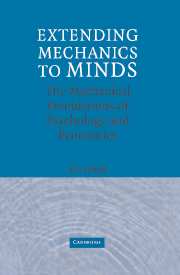Book contents
- Frontmatter
- Contents
- Preface
- Outline of the book
- Part I Reconciling Natural and Mental Philosophy
- Part II Reconstructing Rational Mechanics
- Part III Mechanical Minds
- 8 Mental varieties
- 9 Mind and body
- 10 Attitudes, outlook, and memory
- 11 Reasoning
- 12 Rationality
- 13 Learning
- 14 Uncertainty
- Part IV The Metaphysics of Mechanics
- Part V Conclusion of the Matter
- System of Notation
- Bibliography
- Index
13 - Learning
from Part III - Mechanical Minds
Published online by Cambridge University Press: 21 September 2009
- Frontmatter
- Contents
- Preface
- Outline of the book
- Part I Reconciling Natural and Mental Philosophy
- Part II Reconstructing Rational Mechanics
- Part III Mechanical Minds
- 8 Mental varieties
- 9 Mind and body
- 10 Attitudes, outlook, and memory
- 11 Reasoning
- 12 Rationality
- 13 Learning
- 14 Uncertainty
- Part IV The Metaphysics of Mechanics
- Part V Conclusion of the Matter
- System of Notation
- Bibliography
- Index
Summary
While reasoning can produce temporary changes of location, learning produces persistent changes of mass or configuration. When someone temporarily responds to instruction or threat but then reverts to an old behavior when the teacher or threat departs, we say that person did not learn anything. Mechanically, we would identify such response with an elastic material that rebounds on relief from compression, but such elastic behavior does not produce the permanent changes we associate with thought. True learning, involving change of mass or deformation of spatial configuration, constitutes plastic changes in the character of the material, including dynamogenetic changes that affect material response. In this chapter, let us consider learning involving changes of habits represented in the mass and changes of configuration represented in position. We distinguish types of reasoning and learning both by the types of changes involved and by the types of forces producing the change.
Accretion
The simplest sort of changes to memory just add new elements to the long-term memory represented by the mass of the agent. Such accretion also represents the effects of the most common sort of inference and learning mechanisms.
Many psychological theories view learning as transfer of information from short-term memory to long-term memory. Different theories of learning posit different means for effecting this transfer. Some theories require transfer to long-term memory of some beliefs in short-term memory simply because they persist long enough in short-term memory.
Information
- Type
- Chapter
- Information
- Extending Mechanics to MindsThe Mechanical Foundations of Psychology and Economics, pp. 326 - 345Publisher: Cambridge University PressPrint publication year: 2006
